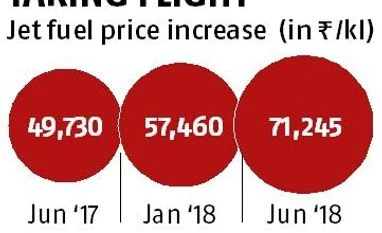Shrinking economics of flying
- Air India has put a freeze on overtime pay, staff conveyance, and travel expense
- Jet Airways has cut down on flights, contemplates a buy-on-board for meals
- IndiGo, SpiceJet have put a freeze on salary increments for employees
- GoAir is looking to moderate growth and phase out old planes
- Vistara is contemplating a denser cabin, a no-frills basic economy fare for non-profitable non-metro routes
To read the full story, Subscribe Now at just Rs 249 a month
Already a subscriber? Log in
Subscribe To BS Premium
₹249
Renews automatically
₹1699₹1999
Opt for auto renewal and save Rs. 300 Renews automatically
₹1999
What you get on BS Premium?
-
Unlock 30+ premium stories daily hand-picked by our editors, across devices on browser and app.
-
Pick your 5 favourite companies, get a daily email with all news updates on them.
Full access to our intuitive epaper - clip, save, share articles from any device; newspaper archives from 2006.
Preferential invites to Business Standard events.
Curated newsletters on markets, personal finance, policy & politics, start-ups, technology, and more.
Need More Information - write to us at assist@bsmail.in
)